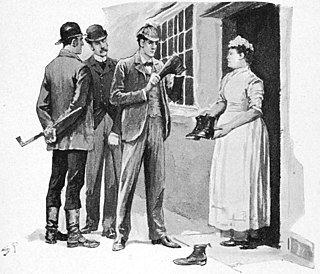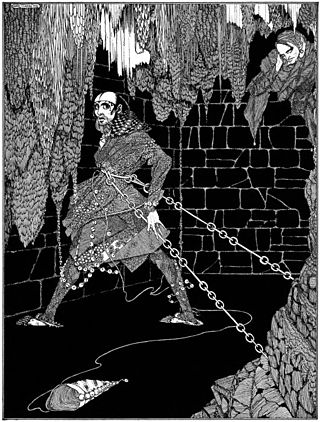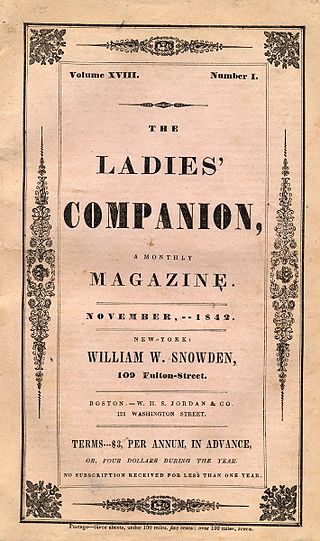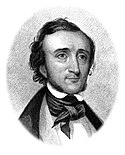
Detective fiction is a subgenre of crime fiction and mystery fiction in which an investigator or a detective—whether professional, amateur or retired—investigates a crime, often murder. The detective genre began around the same time as speculative fiction and other genre fiction in the mid-nineteenth century and has remained extremely popular, particularly in novels. Some of the most famous heroes of detective fiction include C. Auguste Dupin, Sherlock Holmes, and Hercule Poirot. Juvenile stories featuring The Hardy Boys, Nancy Drew, and The Boxcar Children have also remained in print for several decades.

Edgar Allan Poe was an American writer, poet, author, editor, and literary critic who is best known for his poetry and short stories, particularly his tales of mystery and the macabre. He is widely regarded as a central figure of Romanticism and Gothic fiction in the United States, and of American literature. Poe was one of the country's earliest practitioners of the short story, and is considered the inventor of the detective fiction genre, as well as a significant contributor to the emerging genre of science fiction. He is the first well-known American writer to earn a living through writing alone, resulting in a financially difficult life and career.

"The Raven" is a narrative poem by American writer Edgar Allan Poe. First published in January 1845, the poem is often noted for its musicality, stylized language, and supernatural atmosphere. It tells of a distraught lover who is paid a mysterious visit by a talking raven. The lover, often identified as a student, is lamenting the loss of his love, Lenore. Sitting on a bust of Pallas, the raven seems to further antagonize the protagonist with its constant repetition of the word "Nevermore". The poem makes use of folk, mythological, religious, and classical references.

"The Masque of the Red Death" is a short story by American writer Edgar Allan Poe, first published in 1842. The story follows Prince Prospero's attempts to avoid a dangerous plague, known as the Red Death, by hiding in his abbey. He, along with many other wealthy nobles, hosts a masquerade ball in seven rooms of the abbey, each decorated with a different color. In the midst of their revelry, a mysterious figure disguised as a Red Death victim enters and makes his way through each of the rooms. Prospero dies after confronting this stranger, whose "costume" proves to contain nothing tangible inside it; the guests also die in turn.

"The Murders in the Rue Morgue" is a short story by Edgar Allan Poe published in Graham's Magazine in 1841. It has been described as the first modern detective story; Poe referred to it as one of his "tales of ratiocination".

"The Cask of Amontillado" is a short story by the American writer Edgar Allan Poe, first published in the November 1846 issue of Godey's Lady's Book. The story, set in an unnamed Italian city at carnival time, is about a man taking fatal revenge on a friend who, he believes, has insulted him. Like several of Poe's stories, and in keeping with the 19th-century fascination with the subject, the narrative follows a person being buried alive – in this case, by immurement. As in "The Black Cat" and "The Tell-Tale Heart", Poe conveys the story from the murderer's perspective.

The Edgar Allan Poe Awards, popularly called the Edgars, are presented every year by the Mystery Writers of America, based in New York City. Named after American writer Edgar Allan Poe (1809–1849), a pioneer in the genre, the awards honor the best in mystery fiction, non-fiction, television, film, and theater published or produced in the previous year.

"Annabel Lee" is the last complete poem composed by American author Edgar Allan Poe. Like many of Poe's poems, it explores the theme of the death of a beautiful woman. The narrator, who fell in love with Annabel Lee when they were young, has a love for her so strong that even angels are envious. He retains his love for her after her death. There has been debate over who, if anyone, was the inspiration for "Annabel Lee". Though many women have been suggested, Poe's wife Virginia Eliza Clemm Poe is one of the more credible candidates. Written in 1849, it was not published until shortly after Poe's death that same year.

"The Conqueror Worm" is a poem by Edgar Allan Poe about human mortality and the inevitability of death. It was first published separately in Graham's Magazine in 1843, but quickly became associated with Poe's short story "Ligeia" after Poe added the poem to a revised publication of the story in 1845. In the revised story, the poem is composed by the eponymous Ligeia, and taught to the narrator in the fits of her death throes.

Book the Seventh: The Vile Village is the seventh novel in the children's book series A Series of Unfortunate Events by Lemony Snicket.

Le ChevalierC. Auguste Dupin is a fictional character created by Edgar Allan Poe. Dupin made his first appearance in Poe's 1841 short story "The Murders in the Rue Morgue", widely considered the first detective fiction story. He reappears in "The Mystery of Marie Rogêt" (1842) and "The Purloined Letter" (1844).

"The Mystery of Marie Rogêt", often subtitled A Sequel to "The Murders in the Rue Morgue", is a short story by American writer Edgar Allan Poe written in 1842. This is the first murder mystery based on the details of a real crime. It first appeared in Snowden's Ladies' Companion in three installments, November and December 1842 and February 1843. Poe referred to it as one of his "tales of ratiocination".

Edgar Allan Poe's poem "The Raven" has been frequently referenced and parodied in contemporary culture. Immediately popular after the poem's publication in 1845, it quickly became a cultural phenomenon. Some consider it the best poem ever written. As such, modern references to the poem continue to appear in popular culture.

The Poe Shadow is a novel by Matthew Pearl, first published by Random House in 2006. It tells the story of one young lawyer's quest to solve the mystery of Edgar Allan Poe's death in 1849. It is a work of historical and literary fiction, where some previously unpublished details about the last days of Poe are conveyed through the thoughts and the actions of the main character, along with the generally shared ideas on Poe's death as of the publication date.

The Man with a Cloak is a 1951 American film noir crime-thriller-drama directed by Fletcher Markle and starring Joseph Cotten, Barbara Stanwyck, Louis Calhern, and Leslie Caron, and based on "The Gentleman from Paris", a short story by John Dickson Carr.

American poet and short story writer Edgar Allan Poe has had significant influence in television and film. Many are adaptations of Poe's work, others merely reference it.
Nevermore was an American heavy metal band from Seattle, Washington, United States.
Edgar Allan Poe's 1842 short story "The Masque of the Red Death" has been depicted and referenced numerous times in popular culture.
Nevermore: The Imaginary Life and Mysterious Death of Edgar Allan Poe is a musical that was written, composed, and directed by Jonathan Christenson and designed by Bretta Gerecke. It follows the life of Edgar Allan Poe and the internal and external struggles he faced which are depicted as inspiring his writings. In the play, Poe struggles with tragedies such as death, abandonment, addiction, poverty, and loss. The script contains many references to Poe's poems and short stories. The script fictionalizes true events that took place in his life while also incorporating his creative works and poems. It was originally produced at the Catalyst Theater in Edmonton, Alberta, for an 11-week production that then went on to be performed at theater festivals, theaters across Canada, to the Barbican Theater in London, and the New Victory Theater in New York City.

Rosalie Mackenzie Poe was an American poet and the sister of Edgar Allan Poe.















